Early Modern %26 Modern English
2018英语二译文
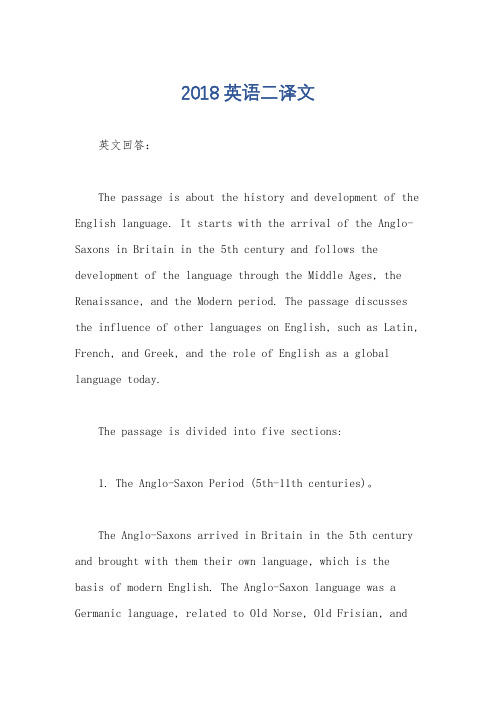
2018英语二译文英文回答:The passage is about the history and development of the English language. It starts with the arrival of the Anglo-Saxons in Britain in the 5th century and follows the development of the language through the Middle Ages, the Renaissance, and the Modern period. The passage discusses the influence of other languages on English, such as Latin, French, and Greek, and the role of English as a global language today.The passage is divided into five sections:1. The Anglo-Saxon Period (5th-11th centuries)。
The Anglo-Saxons arrived in Britain in the 5th century and brought with them their own language, which is the basis of modern English. The Anglo-Saxon language was a Germanic language, related to Old Norse, Old Frisian, andOld Saxon. It was a highly inflected language, with a complex system of noun declensions and verb conjugations.2. The Middle English Period (11th-15th centuries)。
00832英语词汇学复习资料

《英语词汇学》复习资料以下是我整理的英语词汇学的资料。
我在考的时候主要就是靠这个东东。
希望对还没有过的人有所帮助。
大家请注意:笔记中大多数是以名词解释的形式出现的,这些是绝对的基础,应该一字不漏的背下来。
其实不少简答题也就是几个定义的汇总,再加上个例子就可以拿满分了。
区分两个词的区别,主要还是指明其各自的定义。
第一章1. Word —— A word is a minimal free form of a language that has a given sound and meaning and syntactic function.2. There is no logical relationship between sound and meaning as the symbolic connection between them is arbitrary and conventional. E.g. “woman” means ’Frau’ in German,’Femme’ in French and ’Funv ’in Chinese. On the other hand, the same sound /rait/ can mean right, rite and write,though denoting different things, yet have the same sound.3. The difference between sound and form result from 4 major factors.(At least 80%of the English words fit consistent spelling patterns)a). the internal reason is English alphabet does not have a separate letter to represent each sound in the language.b). Pronunciation has changed more rapidly than spellingc). Influence of the work of scribes/printing freezes the spelling of words in 1500d). Borrowing of foreign language4. Vocabulary —— Vocabulary is most commonly used to refer to the sum total of all the words of a language. It can also refer to all the words of a given dialect, a given book, a given subject and all the words possessed by an individual person as well as all the words current in a particular period of time in history.The general estimate of the present day English vocabulary is over 1 million words.5.Classification of Words—by use frequency, by notion, by origin1). Basic word stock – the foundation of the vocabulary.1. all national character (most important)– natural phenomenamost common things and phenomena of the human body and relations world around us names of plants and animalsaction, size, domain, statenumerals, pronouns, prep. ,conj.2. stability – they donate the commonest thing necessary to life, they are like to remain unchanged. Only relative, some are undergoing some changes. But the change is slow.e.g. arrow, bow, chariot, knight – pastelectricity, machine, car, plane —— now3. productivity – they are mostly root words or monosyllabic words,they can form new words with other roots and affixes.e.g. foot – football, footage, footpath, footer4. polysemy – often possess more than one meaning. Become polysemous.e.g. take to move or carry from one place to anotherto remove5. collocability – quite a number of set expressions, idiomatic usages,proverbial saying and otherse.g. heart – a change of heart, a heart of goldNon-basic vocabulary ——1. terminology – technical termsphotoscanning, hepatitis, indigestion, penicillin, algebra,trigonometry, calculus2. jargon – specialized vocabulary in certain professions.Bottom line, ballpark figures, bargaining chips, hold him back, hold him in, paranoid3. slang —— substandard words often used in informal occasionsdough and bread, grass and pot, beaver, smoky, bear, catch,holler, Roger, X-rays,Certain words are labeled slang because of their usage.4. argot – words used by sub-cultured groupscan-opener, dip, persuadercant, jargon , argot are associated with, or most available to,specific groups of the population.5. dialectal words – only by speakers of the dialectbeauty, chook, cocky, station, auld, build, coo, hame,lough, bog6. archaisms – words no longer in common use or restricted in use. In older poems, legal document and religious writing or speech.7. neologism – newly created words with new meaning e.g. microelectronics, futurology, AIDS, internet, E-mailold meaning acquired new meaning e.g. mouse, monitor2). Content word (notional word)– denote clear notions.Functional word (empty word, form word)– do not have notions of their own, express the relation between notions, words and sentences.a. Content words constitute the main body of the English vocabulary are numerous.Functional words are in a small number.b. Content words are growing.Functional words remain stable.c. Functional words do far more work of expression than content words.3). Native words – are words brought to Britain in the 15 century by the German tribes. Ango-Saxon Words, 50,000-60,000What is true of the basic word stock is also true of native world. More are1. neutral in style (not stylistical specific )2. 2.frequent in use (in academic fields and science French, Latin or Greek are used)(usage 70-90%)Borrowed words (loan words, borrowing)– words taken over from foreign language. 80%According to the degree of assimilation and manner of borrowing, we can bring the loan words under 4 classes.1.Denizens – words borrowed early and now are well assimilated into English language.e.g. port from portus(L) shift, change, shirt, porkcup from cuppa(L)2.Aliens – retained their original pronunciation and spellinge.g. décor(F) blitzkreeg(G) emir, intermez, rowtow, bazaar,rajar, status quo3.translation loans – formed from the existing material in the English language but modeled on the patterns taken from another language.1). Word translated according to the meaninge.g. mother tough from lingua maternal(L)black humor from humor noirlong time no see, surplus value, master piece2). Words translated according to the sounde.g. kulak from kyrak(Russ)lama from lama(Tib)ketchuptea4. Semantic loans – their meaning are borrowed from another languagee.g. stupid old dumpnew sassydream old joy and peacepioneer old explorer/person doing pioneering worknew a member of the young pioneerfresh old impertinent, sassy, cheeky第二章Indo-European language family (Europe, the Near East, India)Balto –Slavic Indo-Iranian Italic GermanicPrussian Persian Portuguese NorwegianLithuanian Hindi Spanish IcelandiePolish Italian DanishBulgarian Roumanian SwedishSlovenian French EnglishRussian GermanAlbanian Armenian Celtic HellenicIrish GreekBretonScottish2. History (时间,历史事件,特征)1) Old English (450-1150) totally 50,000-60,000 wordsThe 1st people known to inhabit England were Celts, the language was Celtic.The second language was the Latin of the Roman Legions.The Germanic tribes called angles, Saxons and Jutes and their language, Anglo-Saxon dominated and blotted out the Celtic. Now people refer to Anglo-Saxon as old English.At the end of 6th century, the introduction of Christianity has a great impact on the English vocabulary.The common practice was to create new words by combining two native words.In the 9th century, many Scandinavian words came into English. At least 900 words of Scandinavian are in modern English, our daily life and speech.特点: highly inflected languagecomplex endings or vowel changes (full ending)2) Middle English (1150-1500) English, Latin, FrenchUntil 1066, although there were borrowings from Latin, the influence on English was mainly Germanic. But the Norman Conquest started a continual flow of French words into English.By the end of the 13th century, English gradually come back into public areas.Between 1250 and 150 about 9000 words of French origin come into English. 75% of them are till in use today.As many as 2500 words of Dutch origin come into English.特点: fewer inflectionsleveled ending3) Modern English (1500-up to now) early modern English (1500-1700)late modern English(1700-up to now)The Renaissance, Latin and Greek were recognized as the languages of the Western world’s great literary heritage.The Industrial Revolution was in the mid-17 century. With the growth of colonization, British tentacles began a stretching out of to every corner of the globe, thus enabling English to absorb words from all major languages of the world.After World War II, many new words have been created to express new ideas, inventions and scientific achievements.More words are created by means of word-formation.thousands and thousands of new words have been entered to express new ideas inventions, and scientific achievements.more words are created by means of word-formation.in modern English, word endings were mostly lost with just a few exceptions English has evolved from a synthetic language to the present analytic language.science and technology terms make up about 45% of new words. words associated with life-style constitute of 24% and social and economic terms amount to over 10% .mention should be made of an opposite process of development i.e. old words falling out if use.特点: ending are almost lost.3. Three main sources new words1.The rapid development of modern science and technology2.Social, economic and political changes3.The influence of other cultures and languages4. Three modes of vocabulary development1. Creation – the formation of new words by using the existing materials, namely roots, affixes and other elements. (This is the most important way of vocabulary expansion.)2. Semantic change - an old form which take on a new meaning to meet the new need.3. Borrowing – to take in words from other languages.(particularly in earlier time)4. (Reviving archaic or obsolete)French 30%, Latin 8%, Japanese Italian 7%, Spanish 6%, German Greek 5%, Russian Yiddish 4%第三章1. Morpheme —— A morpheme is the smallest meaningful unit of a language. (The smallest functional unit in the composition of words.)2.Morph—— A morpheme must be realized by discrete units. These actual spoken minimal carriers of meaning are morphs.3.Monomorphenic words – morphemes are realized by single morphs.4.Allomorph——Some morphemes are realized by more than one morph according to their position. Such alternative morphs are allomorphemes. E.g. the morpheme of plurality (-s) has a number if allomorphemes in different sound context, e.g. in cats/s/, in bags/z/, in matches/iz/.5. Free morphemes or Free root —— The morphemes have complete meaning and van be used as free grammatical units in sentences, e.g. cat,walk. They are identical with root words. morphemes which are independent of other morphemes are considered to be free.6. Bound Morphemes —— The morphemes cannot occur as separate words. They are bound to other morphemes to form words, e.g. recollection (re+collect+ion) collect – free morpheme re-and –ion are boundmorphemes. (include bound root and affix) Bound morphemes are found in derived words.7. Bound root —— A bound root is that part of the word that carries the fundamental meaning just like a free root. Unlike a free root, it is a bound form and has to combine with other morphemes to make words. Take -dict- for example:it conveys the meaning of “say or speak” as a Latin root, but not as a word. With the prefix pre-(=before) we obtain the verb predict meaning “tell beforehand”。
英语发展史_教学课件 Part 1Early_Modern_English_2
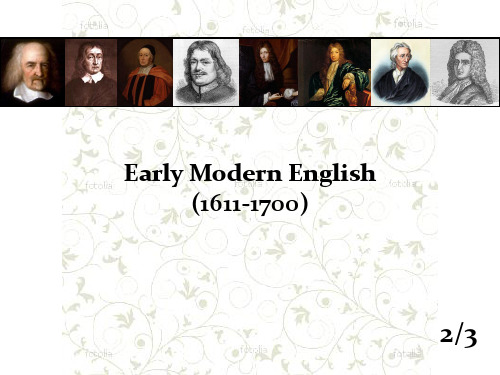
1633 King James English trading posts
established in Bengal.
1637 English traders established in
Canton.
1639 English established at Madras.
1640 Twenty-four pamphlets were
Pilgrim’s Progress. / Dryden published his greatest play: All for Love.
1679 Parliament dismissed; Charles II
rejected petitions calling for a new Parliament; petitioners became known as Whigs; their opponents (royalists) known as Tories.
Bengal
Ben Jonson
(1572-1637)
The Civil War
1646 English occupied the Bahamas.
1648 Second Civil War.
1649 Charles I beheaded.
Commonwealth established.
1651 Thomas Hobbes published his
outbreak of bubonic plague in England.
The Royal Society
1666 The great fire of London.
New Amsterdam
1667 John Milton, the greatest of English
人教版高中英语必修一unit2sectionⅲ学业分层测评(五)
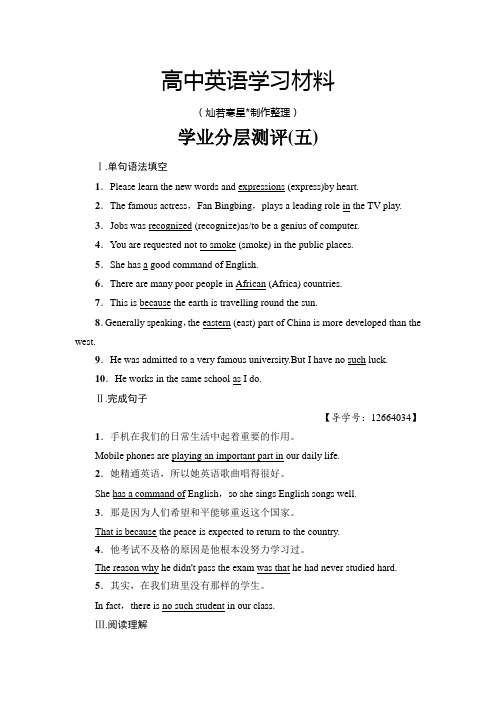
高中英语学习材料(灿若寒星*制作整理)学业分层测评(五)Ⅰ.单句语法填空1.Please learn the new words and expressions (express)by heart.2.The famous actress,Fan Bingbing,plays a leading role in the TV play.3.Jobs was recognized (recognize)as/to be a genius of computer.4.You are requested not to smoke (smoke) in the public places.5.She has a good command of English.6.There are many poor people in African (Africa) countries.7.This is because the earth is travelling round the sun.8.Generally speaking,the eastern (east) part of China is more developed than the west.9.He was admitted to a very famous university.But I have no such luck.10.He works in the same school as I do.Ⅱ.完成句子【导学号:12664034】1.手机在我们的日常生活中起着重要的作用。
Mobile phones are playing an important part in our daily life.2.她精通英语,所以她英语歌曲唱得很好。
She has a command of English,so she sings English songs well.3.那是因为人们希望和平能够重返这个国家。
英语语言的发展史

• The Roman Occupation(55 B.C.- 410 ) -- 55 B.C., Roman invasion of Britain by Julius Caesar (尤里乌斯· 凯撒) -- 43 B.C., Roman invasion and occupation. Beginning of Roman rule of Britain . -- 410 A.D., Roman power in Britain collapsed. -- 436 A.D., Roman withdrawal from Britain complete. (Textbook 7th para.)
• 特别是法语,由于与英国一直保持着密切 关系,法语词仍然源源不断地传入英语。 • 1660年英国王朝复辟, 社会风气十分奢靡, 王室贵族崇尚法国文化, 以说法语为时髦风 雅, 大批军事、外交、艺术、饮食方面的词 汇被英国吸收。如: government, empire, royal, majesty, duke, painting, ballet , cartoon, fry, beef, painting, ballet cartoon 等.
AHistoryoftheEnglishLanguage
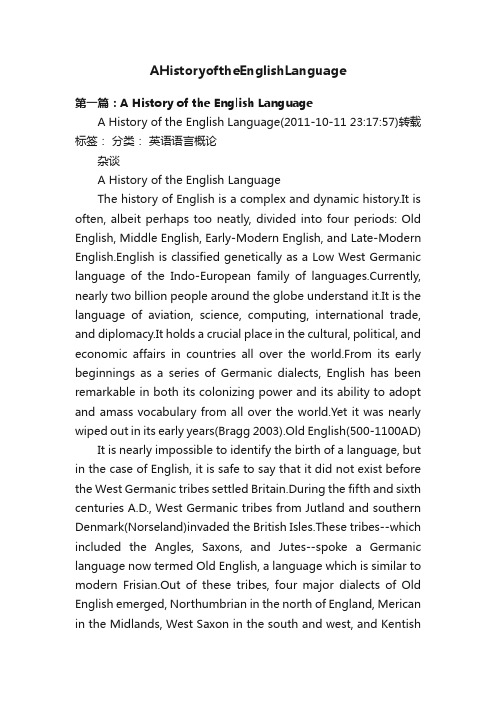
AHistoryoftheEnglishLanguage第一篇:A History of the English LanguageA History of the English Language(2011-10-11 23:17:57)转载标签:分类:英语语言概论杂谈A History of the English LanguageThe history of English is a complex and dynamic history.It is often, albeit perhaps too neatly, divided into four periods: Old English, Middle English, Early-Modern English, and Late-Modern English.English is classified genetically as a Low West Germanic language of the Indo-European family of languages.Currently, nearly two billion people around the globe understand it.It is the language of aviation, science, computing, international trade, and diplomacy.It holds a crucial place in the cultural, political, and economic affairs in countries all over the world.From its early beginnings as a series of Germanic dialects, English has been remarkable in both its colonizing power and its ability to adopt and amass vocabulary from all over the world.Yet it was nearly wiped out in its early years(Bragg 2003).Old English(500-1100AD) It is nearly impossible to identify the birth of a language, but in the case of English, it is safe to say that it did not exist before the West Germanic tribes settled Britain.During the fifth and sixth centuries A.D., West Germanic tribes from Jutland and southern Denmark(Norseland)invaded the British Isles.These tribes--which included the Angles, Saxons, and Jutes--spoke a Germanic language now termed Old English, a language which is similar to modern Frisian.Out of these tribes, four major dialects of Old English emerged, Northumbrian in the north of England, Merican in the Midlands, West Saxon in the south and west, and Kentishin the Southeast.These tribes, along with the English language, may well have been wiped out altogether by Viking raiders if not for a Wessex king named Alfred the Great.After defeating the Vikings, who threatened both the English way of life and its language, Alfred the Great encouraged English literacy throughout his kingdom(McCrum, et al 1986).Before the Germanic tribes arrived, the Celts were the original inhabitants of Britain.When the Germanic tribes invaded England, they pushed the Celt-speaking inhabitants out of England into what is now Scotland, Wales, Cornwall, and Ireland.The Celtic language survives today in the Gaelic languages, and some scholars speculate that the Celtic tongue might have influenced the grammatical development of English, though the influence would have been minimal(Bryson 1990).Around A.D.850, Vikings or Norsemen made a significant impact on the English language by importing many North Germanic words into the language.From the middle of the ninth century, large numbers of Norse invaders settled in Britain, especially in the northern and eastern areas and, in the eleventh century, a Danish(Norse)King, Canute, ruled England.The North Germanic speech of the Norsemen had a fundamental influence on English.They added basic words such as “that,” “they,” and “them,” and also may have been responsible for some of the morphological simplification of Old English, including the loss of grammatical gender and cases(Bragg 2003).The majority of words that constitute Modern English do not come from Old English roots(only about one sixth of known Old English words have descendants surviving today), but almost all of the 100 most commonly used words in modern English do have Old English roots.Words like “water,” “strong,” “the,” “of,” “a,” “he”“no” and many other basic modern English words derive from Old English(Bragg 2003).Still, the English language we know today is a far cry from its Old English ancestor.This is evidenced in the epic poem Beowulf, which is the best known surviving example of Old English(McCrum, et al 1986), but which must be read in translation to modern English by all but those relative few who have studied the work in the original.The Old English period ended with the Norman Conquest, when the language was influenced to an even greater extent by the French-speaking Normans.The Norman Conquest and Middle English(1100-1500)In 1066, William the Conqueror, Duke of Normandy, invaded and conquered England and the Anglo-Saxons.After the invasion, the Norman kings and the nobility spoke a dialect of Old French known as Anglo-Norman, while English continued to be the language of the common people.This class distinction can still be seen in the English language today in words such as “beef” vs.“cow” and “pork” vs.“pig.” The aristocracy commonly ate beef and pork, which are derivatives of Anglo-Norma, while the Anglo-Saxon commoners, who tended the cattle and hogs, retained the Germanic and ate cow and pig.Many legal terms, such as “indict,” “jury,” and “verdict” also have Anglo-Norman roots because the Normans ruled the courts.It was not uncommon for French words to replace Old English words;for example, “uncle” replaced “eam” and “crime” replaced “firen.” French and English also combined to form new words, such as the French “gentle” and the Germanic “man” forming “gentleman”(Bryson1990).To this day, French-based words hold a more official connotation than do Germanic-based ones.When the English King John lost the province of Normandy to the King of France in 1204, the Normannobles of England began to lose interest in their properties in France and began to adopt a modified English as their native tongue.When the bubonic plague devastated Europe, the dwindling population served to consolidate wealth.The old feudal system crumbled as the new middle class grew in economic and social importance as did their language in relation to Anglo-Norman.The highly inflected system of Old English gave way to, broadly speaking, the same system of English found today which, unlike Old English, does not use distinctive word endings.Unlike Old English, Middle English can be read(albeit with some difficulty)by modern English speakers.By 1362, the linguistic division between the nobility was largely over and the Statue of Pleading was adopted, making English the language of the courts and Parliament.Edward the III became the first king to address Parliament in English in 1362, and the first English government document to be published in English since the Norman Conquest was the Provisions of Oxford.And the most famous literary example of Middle English is Chaucer’s Canterbury Tales.The Middle English period came to a close around 1500 with the rise of Modern English(McCrum, et al 1986).Early Modern English(1500-1800)The Renaissance brought with it widespread innovation in the English language.The rediscovery of classical scholarship created an influx of classical Latin and Greek words into the language.While Latin and Greek borrowings diversified the language, some scholars adopted Latin terms awkwardly and excessively, leading to the derogatory term “inkhorn.” An important item for scholars, an inkhorn was simply a horn pot that held ink for quills...but later it became a deprecatory term for pedantic writers who borrowed obscure and opulent termssuch as “revoluting” and “ingent affability”(Bragg 2003).The invention of the printing press also marked the division from Old English to Modern English as books became more widespread and literacy increased.Soon publishing became a marketable occupation and books written in English were often more popular than books in Latin.The printing press also served to standardize English.The written and spoken language of London already influenced the entire country, and with the influence of the printing press, London English soon began to dominate.Indeed, London standard became widely accepted, especially in more formal context.Soon English spelling and grammar were fixed and the first English dictionary was published in 1604(Bryson 1990).In the fifteenth century, the Great Vowel Shift--a series of changes in English pronunciation--further changed the English language.These purely linguistic sound changes moved the spoken language away from the so-called “pure” vowel sounds which still characterize many Continental languages today.Consequently, the phonetic pairings of most long and short vowel sounds were lost, resulting in the oddities of English pronunciation and obscuring the relationship of many English words and their foreign roots.The Great Vowel Shift was rather sudden and the major changes occurred within a century, though the shift is still in process and vowel sounds are still shortening, albeit much more gradually.The causes of the shift are highly debated.Some scholars argue that such a shift occurred due to the “massive intake of Romance loanwords so that English vowels started to sound more like French loanwords.Other scholars suggest it was the loss of inflectional morphology that started the shift”(Bragg 2003).Late-Modern English(1800-Present)The pronunciation, grammar, and spelling of Late-Modern English are essentially the same as Early-Modern English, but Late-Modern English has significantly more words due to several factors.First, discoveries during the scientific and industrial revolutions created a need for a new vocabulary.Scholars drew on Latin and Greek words to creat e new words such as “oxygen,” “nuclear,” and “protein.” Scientific and technological discoveries are still ongoing and neologisms continue to this day, especially in the field of electronics and computers.Just as the printing press revolutionized both spoken and written English, the new language of technology and the Internet places English in a transition period between Modern and Postmodern.Second, the English language has always been a colonizing force.During the medieval and early modern periods, the influence of English quickly spread throughout Britain, and from the beginning of the seventeenth century on, English began to spread throughout the world.Britain’s maritime empire and military influence on language(especially after WWII)has consequently been significant.Britain’s complex colonization, exploration, and overseas trade both imported loanwords from all over the world(such as “shampoo,” “pajamas,” and “yogurt”)and also led to the development of new varieties of English, each with its own nuances of vocabulary, grammar, and pronunciation.Significantly, one of England’s colonies, America, created what is known as American English and, in some respects, American English is closer to the English of Shakespeare than the modern Standard British English(or the modern Queen’s English)because many Americanisms are originally British expressions that were preserved in the colonies while lost at home(e.g., “trash” for “rubbish”).Native American andSpanish vocabulary have also been a great influence on American English, importing or adopting such words as “raccoon,” “canoe,” “mustang,” “ranch,” and “vigilante”(Bragg 2003).Global EnglishRecently, English has become a lingua franca, a global language that is regularly used and understood by many countries where English is not the first/native language.In fact, when Pope John Paul II went to the Middle East to retrace Christ’s footsteps and addressed Christians, Muslims, and Jews, the Pope didn’t speak Arabic, Italian, Hebrew, or his native Polish;instead, he spoke in English.In fact, English is used in over 90 countries, and it is the working language of the Asian trade group ASEAN and of 98 percent of international research physicists and chemists.It is also the language of computing, international communication, diplomacy, and navigation.Over one billion people worldwide are currently learning English, making it unarguably a global language.--Posted January 27, 2008ReferencesBragg, Melvyn.2003.The Adventure of English: The Biography of a Language.New York: Arcade Publishing.Bryson, Bill.1990.Mother T ongue: English and How it Got That Way.New York: Perennial.McCrum, Robert, William Cran, and Robert MacNeil.1986.The Story of English.New York: Viking.。
英语起源和发展

3.本土词汇的单音节化。
4.名词的男女性别固有标示的消失。
5.迎合语言及时代发展的需要灵活地吸收外来语。
以上各因素互为演进而形成了现代英语的规范与特征。语言学家在研究 英语的发展时通常都再把现代英语区分为早期现代英语(Early Modern English)和晚期现 代英语(Late Modern English)。
现代英语在全世界的流用层次可以分为:
(a)母语(Mother tongue):以英语为母语的国家共有英国、美国、 加拿大(含有法语)、澳大利亚、新西兰等,使用人口约为3.5亿人。
(b)公用语(Second language):以英语为公用语的国家遍及五大洲 ,全是英国以前的殖民地和美国的托管地,使用人口据估计(以日用语可通为基准)约为25 亿人。在这25亿人中,英语的使用能力达母语标准者约为6000万人。
公元前55年镇守高卢(Gaul—即今日的法国地区)的罗马守将恺撒 (Julius Caesar[DN(::SU+K>K!:L+]—100~44B.C.)将军挥军渡海入侵了Britannia,拉开 了罗马人统治Britannia长达400年的序幕。这些罗马统治者也就顺理成章地把他们所使用的 拉丁语(Latin)带入Britannia,使凯尔特语与拉丁语在长达400多年的期间中产生了广且深 的语言交融。
当今,大陆的英语教学动向仍然停留在以BrE为主的阶段,但是在可预期 的将来AmE可能会随着美国人在大陆活动的增加而趋于增强其影响。
(2)就地吸收原住民用语:AmE吸收了不少的印地安原住民的词汇,以 动植物名称和地名为多。例如:
地名:Ohio[o(>O%!o(]俄亥俄州(原指Ohio河,是beautiful water的意 思);Mississippi[P!K!>K!A!]密西西比州(原指Mississippi河,是Father of waters的意 思);Kentucky[E+Q>C)E!]肯塔基州(land of tomorrow的意思),etc.
英语发展史

英语语言的历史发展可以分为三个阶段,分别是:古英语(Old English),中世纪英语(Middle English)和现代英语(Modern English)。
古英语(449--1100)。有记载的英语语言起始于449年,当时包括央格鲁-撒克逊人(Angles-Saxons)在内的德国部落入侵大不列颠。他们把原来的居民凯尔特人(the Celts)赶到不列颠的北部和西部角落。凯尔特人的领袖King Arthur带领部队勇敢作战,英勇抗击德国入侵者。这之后在不列颠岛上央格鲁人、撒克逊人和一些德国部落都说着各自的英语。尽管85%的古英语词汇现在已经不再使用,但一些常用词汇如:child, foot, house, man, sun等等还是保留下来。和现代英语相比,古英语中的外来词很少,但派生词缀较多。古英语中还有较多描述性的复合词。如“音乐”是earsport;“世界”是age of man。在著名的英雄史诗《贝奥武甫》(Beowulf)中对此有详尽描述。
现代英语(1500――至今)。1476年,卡克斯顿(William Caxton)在英国开始引进印刷机的使用,标志着中世纪英语转入现代英语阶段。由于读物数量的增多,范围扩大,词汇拼写开始趋向规范化,标准化,固定化。这样一来,读音和拼写之间的差距扩大。另外,随着探险、殖民、以及贸易等各方面走向世界化,给现代英语带来一定的冲击。超过50种语言的外来词涌入英语,如阿拉伯语,法语,德语,荷兰语,俄语,希伯来语,西班牙语,汉语,意大利语等。
The history of English language(英汉双语)
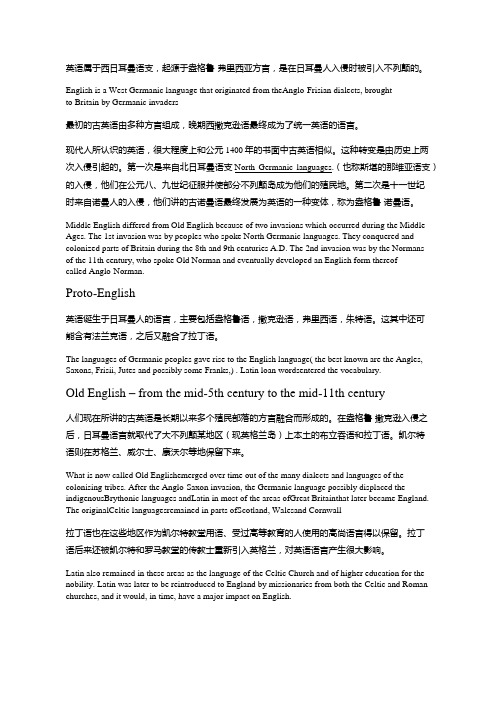
英语属于西日耳曼语支,起源于盎格鲁-弗里西亚方言,是在日耳曼人入侵时被引入不列颠的。
English is a West Germanic language that originated from theAnglo-Frisian dialects, broughtto Britain by Germanic invaders最初的古英语由多种方言组成,晚期西撒克逊语最终成为了统一英语的语言。
现代人所认识的英语,很大程度上和公元1400年的书面中古英语相似。
这种转变是由历史上两的入侵,他们在公元八、九世纪征服并使部分不列颠岛成为他们的殖民地。
第二次是十一世纪时来自诺曼人的入侵,他们讲的古诺曼语最终发展为英语的一种变体,称为盎格鲁-诺曼语。
Middle English differed from Old English because of two invasions which occurred during the Middle Ages. The 1st invasion was by peoples who spoke North Germanic languages. They conquered and colonized parts of Britain during the 8th and 9th centuries A.D. The 2nd invasion was by the Normans of the 11th century, who spoke Old Norman and eventually developed an English form thereofcalled Anglo-Norman.Proto-English英语诞生于日耳曼人的语言,主要包括盎格鲁语,撒克逊语,弗里西语,朱特语。
这其中还可能含有法兰克语,之后又融合了拉丁语。
The languages of Germanic peoples gave rise to the English language( the best known are the Angles, Saxons, Frisii, Jutes and possibly some Franks,) . Latin loan wordsentered the vocabulary.Old English – from the mid-5th century to the mid-11th century人们现在所讲的古英语是长期以来多个殖民部落的方言融合而形成的。
英语发展史与古英语的特点The history of English language and features of old English

Late Modern English (1800----Present)
The main difference between Early Modern English and Late Modern English is vocabulary. Late Modern English has many more words, arising from two principal factors: firstly, the Industrial Revolution and technology created a need for new words; secondly, the British Empire at its height covered one quarter of the earth's surface, and the English language adopted foreign words from many countries.
现代英语 早期现代英语 (1500-1800) 随着中世纪英语的泯灭,发音突然发生了很大的变化 ,元音的发音越来越短。而从16世纪起英国人与世界的接触多了起 来,再加上文艺复兴的影响,导致越来越多的单词和短语被添加到英语中。印刷术的发明使得书面语流行起来。书变得越来 越便宜,更多的人开始学习阅读。印刷术也使英语变得标准化。拼写和语法变得越来越固定,而由于伦敦市大多数出版社的 所在,伦敦方言就变成了标准语言。1604年第一部英文词典出版了。
英语真正的历史应该从公元5世纪时入侵英国的三个日耳曼部落说起. 这几个部落分别是, 盎格鲁人, 撒克逊人,和朱特人, 他们从今天的德国北部和丹麦出发,然后横渡北海。那时候英国的本地居民都说凯尔特语。但由于入侵者的逼迫,他们都被 赶到了西部和北部-主要是现在的威尔士,苏格兰和爱尔兰。入侵者迁入英国,在7世纪末以前,他们所讲的即为早期形式的 英语。
现代英语发展史

现代英语发展史现代英语(1500-- 2019)在早期现代英语时期,对英语词汇影响最大的是文艺复兴运动.文艺复兴运动是14世纪在意大利开始的,在16世纪以后的两个世纪对英国的影响很大,莎士比亚就是英国文艺复兴时期的杰出代表.(In the early modern English period, the greatest influence on English vocabulary is the Renaissance. The Renaissance began in Italy in Fourteenth Century, impact on the UK's two centuries later in sixteenth Century, Shakespeare is an outstandingrepresentative of the English Renaissance.)莎士比亚的作品不仅是文学名著,更重要的是他把外来语和本族语巧妙的结合起来,大大丰富了英语的词汇,增强了英语的表现能力,据统计,他一共运用2万-2.5万个词.以他的中的一小段独白为例:Neptune's ocean wash this blood Clean from my hand? No,this my hand will rat her, The multitudinous seas incarnadine,Making the green one red.multitudinous seas incarnadine Making the green, all the water in the ocean,到中古英语末期,英语已经确立了作为英国国语的地位。
乔叟的作品证明,英语已成为一种成熟的文学语言。
英语语法的简单化过程已大体完成,拼写走向固定,基本词汇也已形成。
总之,现代英语的基础也已经奠定。
【英语发音的本质】中古英语和元音大推移
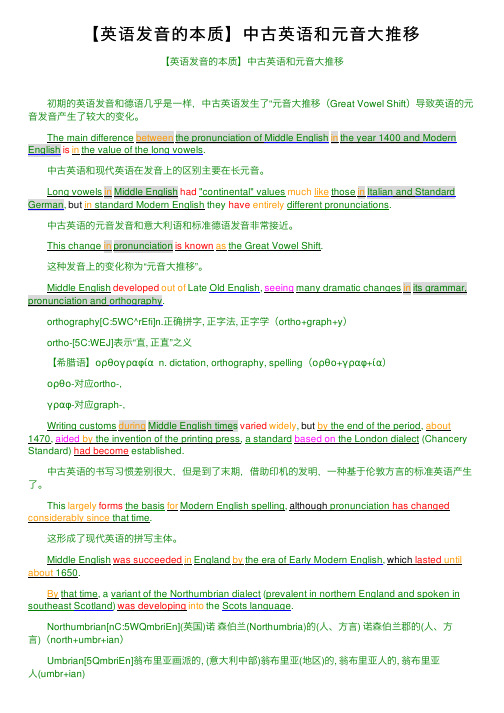
【英语发⾳的本质】中古英语和元⾳⼤推移【英语发⾳的本质】中古英语和元⾳⼤推移初期的英语发⾳和德语⼏乎是⼀样,中古英语发⽣了“元⾳⼤推移(Great Vowel Shift)导致英语的元⾳发⾳产⽣了较⼤的变化。
中古英语和现代英语在发⾳上的区别主要在长元⾳。
中古英语的元⾳发⾳和意⼤利语和标准德语发⾳⾮常接近。
这种发⾳上的变化称为“元⾳⼤推移”。
Late Old English,orthography[C:5WC^rEfi]n.正确拼字,正字法,正字学(ortho+graph+y)ortho-[5C:WEJ]表⽰“直,正直”之义【希腊语】ορθογραφία n. dictation, orthography, spelling(ορθο+γραφ+ία)ορθο-对应ortho-,γραφ-对应graph-,varied widely,but by the end of the period,about 1470,aided by the invention of the printing press, a standard based on the London dialect(Chancery Standard)had become established.中古英语的书写习惯差别很⼤,但是到了末期,借助印机的发明,⼀种基于伦敦⽅⾔的标准英语产⽣了。
This largely forms the basis for Modern English spelling,although pronunciation has changed considerably since that time.这形成了现代英语的拼写主体。
Middle English was succeeded in England by the era of Early Modern English,which lasted until about1650.By that time, a variant of the Northumbrian dialect (prevalent in northern England and spoken in southeast Scotland)was developing into the Scots language.Northumbrian[nC:5WQmbriEn](英国)诺森伯兰(Northumbria)的(⼈、⽅⾔)诺森伯兰郡的(⼈、⽅⾔)(north+umbr+ian)Umbrian[5QmbriEn]翁布⾥亚画派的, (意⼤利中部)翁布⾥亚(地区)的,翁布⾥亚⼈的,翁布⾥亚⼈(umbr+ian)umbr-在拉丁语中表“阴影”。
英语
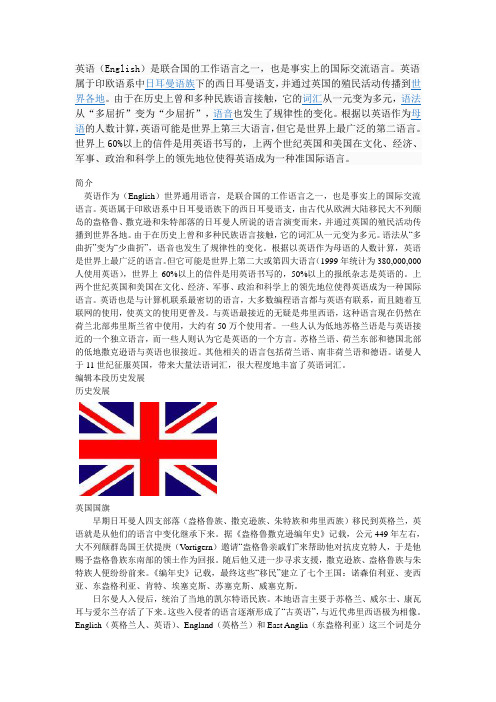
简介英语作为(English)世界通用语言,是联合国的工作语言之一,也是事实上的国际交流语言。
英语属于印欧语系中日耳曼语族下的西日耳曼语支,由古代从欧洲大陆移民大不列颠岛的盎格鲁、撒克逊和朱特部落的日耳曼人所说的语言演变而来,并通过英国的殖民活动传播到世界各地。
由于在历史上曾和多种民族语言接触,它的词汇从一元变为多元。
语法从“多曲折”变为“少曲折”,语音也发生了规律性的变化。
根据以英语作为母语的人数计算,英语是世界上最广泛的语言。
但它可能是世界上第二大或第四大语言(1999年统计为380,000,000人使用英语),世界上60%以上的信件是用英语书写的,50%以上的报纸杂志是英语的。
上两个世纪英国和美国在文化、经济、军事、政治和科学上的领先地位使得英语成为一种国际语言。
英语也是与计算机联系最密切的语言,大多数编程语言都与英语有联系,而且随着互联网的使用,使英文的使用更普及。
与英语最接近的无疑是弗里西语,这种语言现在仍然在荷兰北部弗里斯兰省中使用,大约有50万个使用者。
一些人认为低地苏格兰语是与英语接近的一个独立语言,而一些人则认为它是英语的一个方言。
苏格兰语、荷兰东部和德国北部的低地撒克逊语与英语也很接近。
其他相关的语言包括荷兰语、南非荷兰语和德语。
诺曼人于11世纪征服英国,带来大量法语词汇,很大程度地丰富了英语词汇。
编辑本段历史发展历史发展英国国旗早期日耳曼人四支部落(盎格鲁族、撒克逊族、朱特族和弗里西族)移民到英格兰,英语就是从他们的语言中变化继承下来。
据《盎格鲁撒克逊编年史》记载,公元449年左右,大不列颠群岛国王伏提庚(V ortigern)邀请“盎格鲁亲戚们”来帮助他对抗皮克特人,于是他赐予盎格鲁族东南部的领土作为回报。
随后他又进一步寻求支援,撒克逊族、盎格鲁族与朱特族人便纷纷前来。
《编年史》记载,最终这些“移民”建立了七个王国:诺森伯利亚、麦西亚、东盎格利亚、肯特、埃塞克斯、苏塞克斯、威塞克斯。
历史类英文单词

历史类英文单词Historical English Vocabulary ExplorationIn the realm of learning a language, mastering vocabulary is crucial. Besides basic everyday words, having a good foundation in historical vocabulary is equally important. Historical English words not only enable us to better understand literature and cultural references, but also provide insights into the development of language over time. In this article, we will delve into various historical English words, exploring their origins, meanings, and usage.1. Old English VocabularyOld English, also known as Anglo-Saxon, refers to the English language spoken from the 5th to the 11th centuries. Although it may seem foreign to modern English speakers, Old English is the precursor to the language we use today. Here are some examples of Old English words:1.1 WyrmDerived from Old English "wyrm," meaning "serpent" or "dragon," this word often appears in ancient mythology and folklore. Beowulf, the famous epic poem, is filled with encounters between the hero and monstrous wyrms.1.2 EorþeIn Old English, "eorþe" means "earth" or "land." This term emphasizes the connection between humans and the natural world, reflecting the importance of agriculture and the physical environment in ancient societies.2. Middle English VocabularyFollowing the era of Old English, Middle English emerged from the 11th to the 15th centuries. This period witnessed significant changes in the English language, including the influence of French and Latin. Let's explore some Middle English words:2.1 Chaucer's Cantréberye TalesGeoffrey Chaucer's renowned work, "The Canterbury Tales," provides a rich source of Middle English vocabulary. Words like "sely" (meaning "innocent" or "simple") and "pilgrim" (a religious traveler) are scattered throughout this collection of stories, painting a vivid linguistic picture of medieval England.2.2 AlchemieDuring the Middle English period, alchemy gained popularity. "Alchemie" referred to the practice of transmuting substances and the search for the philosopher's stone. This word showcases the influence of Arabic and Latin on English vocabulary.3. Early Modern English VocabularyAs the Renaissance unfolded in Europe, so did the English language. Early Modern English, ranging from the 15th to the 17th centuries, saw the language evolve further. Here are some examples:3.1 RenaissanceThe term "renaissance" itself is of French origin, meaning "rebirth." It represents the period of intellectual awakening during which art, literature,and science flourished. This word epitomizes the cultural and linguistic changes that occurred during this time.3.2 Shakespearean ExpressionsWilliam Shakespeare, an iconic figure in English literature, introduced numerous words and phrases into the language. Expressions like "fancy-free" (without romantic attachments) and "moonbeam" (a ray of moonlight) originated from his plays, underscoring his immense contribution to Early Modern English vocabulary.4. Modern English VocabularyFinally, we arrive at Modern English, the form of the language we are familiar with today. While the bulk of our vocabulary belongs to this era, there are still interesting historical words worth examining:4.1 Industrial Revolution TermsWith the advent of the Industrial Revolution in the 18th century, new words entered the English lexicon. Terms like "automobile," "telegraph," and "steam engine" emerged, signifying the technological advancements that transformed society.4.2 Internet Age JargonAs we embrace the digital age, a plethora of new words has appeared. "Selfie," "meme," and "emoji" are examples of vocabulary that reflect our evolving culture and reliance on technology. These words embody the constant evolution and adaptability of the English language.In conclusion, exploring historical English vocabulary not only strengthens our language skills but also provides us with insight into the cultural, social, and technological changes that have shaped our world. From the Old English wyrms to Modern English digital jargon, each word carries a piece of history within its letters. So, let us continue to appreciate and learn from the rich tapestry of historical English words.。
early_modern_english

The invention of the printing press expanded education, communications, and the awareness of social problems which resulted in a new epoch of universal knowledge and interests.
② The sudden social mobility after the Black Death--- with people from lower levels in society moving to higher levels. ③ Hundred Years’ War: medieval aristocracy who had spoken French began using English: change--- either by making pronunciation more French in style, or by changing it to something thought to be "more English"
Enclosure Movement
Sheep eat man
1.5 colonial exploration: established colonies abroad and took the English language out of the continent of Europe. This is related to the new strategy of mercantilism商业主义 (the theory that a nation’s interests are served of overseas trade and restriction of imports). The result is that there are speakers of English in every continent today. In 1600, around the time of Shakespeare, there were about 6 million speakers of English.
仁爱英语九上期中测试题(附答案)
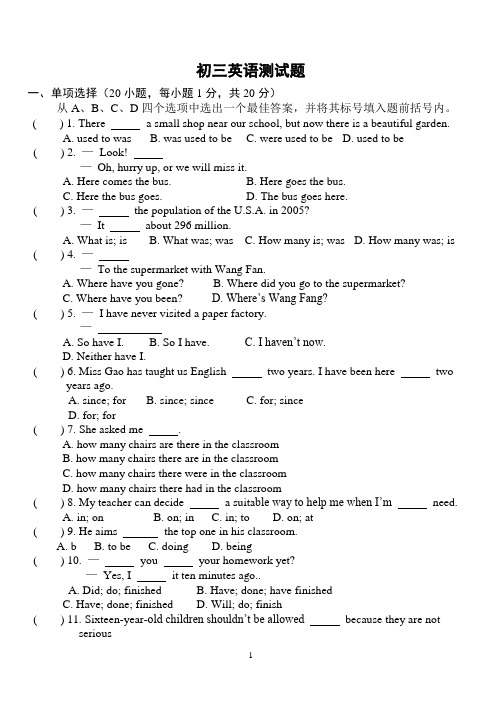
初三英语测试题一、单项选择(20小题,每小题1分,共20分)从A、B、C、D四个选项中选出一个最佳答案,并将其标号填入题前括号内。
( ) 1. There a small shop near our school, but now there is a beautiful garden.A. used to wasB. was used to beC. were used to beD. used to be( ) 2. —Look!—Oh, hurry up, or we will miss it.A. Here comes the bus.B. Here goes the bus.C. Here the bus goes.D. The bus goes here.( ) 3. —the population of the U.S.A. in 2005?—It about 296 million.A. What is; isB. What was; wasC. How many is; wasD. How many was; is ( ) 4. ——To the supermarket with Wang Fan.A. Where have you gone?B. Where did you go to the supermarket?C. Where have you been?D. Where’s Wang Fang?( ) 5. —I have never visited a paper factory.—A. So have I.B. So I have.C. I haven’t now.D. Neither have I.( ) 6. Miss Gao has taught us English two years. I have been here two years ago.A. since; forB. since; sinceC. for; sinceD. for; for( ) 7. She asked me .A. how many chairs are there in the classroomB. how many chairs there are in the classroomC. how many chairs there were in the classroomD. how many chairs there had in the classroom( ) 8. My teacher can decide a suita ble way to help me when I’m need.A. in; onB. on; inC. in; toD. on; at( ) 9. He aims the top one in his classroom.A. bB. to beC. doingD. being( ) 10. —you your homework yet?—Yes, I it ten minutes ago..A. Did; do; finishedB. Have; done; have finishedC. Have; done; finishedD. Will; do; finish( ) 11. Sixteen-year-old children shouldn’t be allowed because they are not seriousenough at that age.A. driveB. drivingC. to be drivingD. to drive( ) 12. _________ exciting news! We will have _______ long holiday after the exam.A. What an, aB. What, aC. How an, theD. How, the( ) 13. I think English is more difficult than _______.A. any subjectB. any subjectsC. any other subjectD. any other subjects ( ) 14. .Kate worked so hard that she was successful _____ math test .A. in passingB. passedC. at passingD. passing( ) 15. ______ little water is not enough for ______ many people.A. Such; soB. So; soC. Such; suchD. So; such( ) 16. I can’t stand for you so long.A. to waitB. waitingC. waitsD. waited( ) 17. —What does the sign on the bottle mean?—It means ―‖.A. This side upB. DangerousC. RecyclableD. No Parking( ) 18. —How about going hiking this weekend?—Sorry, I prefer rather than .A. to stay at home; go outB. to go out; stay at homeC. staying at home; go outD. going out; stay at home( ) 19. of t he world’s books and newspapers are written in English.A. Third quartersB. Three quartersC. Three quarterD. Third quarter( ) 20. She has ____ this car for nearly ten years.A. buyB. boughtC. haveD. had二、完形填空(10小题,每小题1分,共10分)先通读短文,掌握其大意,然后从A、B、C、D四个选项中选出一个可以填入相应空白处的最佳答案,并将其标号填入题前括号內。
英语的演变发展史

英语的演变发展史
英语的演变发展史是一个漫长且复杂的过程。
以下是英语的演变发展史的主要阶段:
1.古英语(Old English)(约5世纪-约11世纪):古英语是英语的最早阶段,起源于5世纪的盎格鲁-撒克逊人的日耳曼语言。
它在语法、发音和词汇方面与现代英语有很大的差异。
2.中古英语(Middle English)(约11世纪-约15世纪):中古英语是古英语向现代英语演变的过渡阶段。
在这个时期,英格兰受到了诺曼底公爵的征服,诺曼法语对英语产生了重要影响。
中古英语的词汇和语法发生了变化。
3.现代英语早期(Early Modern English)(约15世纪-约17世纪):随着英格兰文艺复兴时期的到来,现代英语的早期阶段开始出现。
在这个时期,英语经历了大规模的词汇增加,很多现代英语的拼写和发音规则开始形成。
4.现代英语(Modern English)(17世纪至今):现代英语是指从17世纪开始至今的英语阶段。
它包括早期现代英语、18世纪的乔治时代英语、19世纪的维多利亚时代英语等。
现代英语的词汇和语法经历了进一步的发展和演变,并受到科学、技术和全球化的影响。
值得注意的是,英语的演变发展是一个渐进的过程,没有明确的分界线。
在不同的历史时期,英语还受到了其他语言(如拉丁语、法语和希腊语)的影响,这些影响也对英语的词汇和语法产生了影响。
今天的英语是一种全球性语言,在世界范围内使用广泛。
early modern english近代英语

early modern english近代英语1. Modern英语(English)2. Old英语(Old English)3. Middle英语(Middle English)4. Vocabulary词汇5. Grammar语法6. Pronunciation发音7. Spelling拼写8. Literature文学9. Translation翻译10. Renaissance文艺复兴11. Manuscript手稿12. Sonnet十四行诗13. Play戏剧14. Printing printing15. Vernacular方言16. Bible圣经17. Epic史诗18. Metaphor隐喻19. Dramatic戏剧的20. Romance浪漫的21. Ode颂歌22. Famous著名的1. Early Modern English replaced Middle English in the late 15th century.近代英语取代了中古英语,大约在15世纪末。
2. Shakespeare's plays were written in Early Modern English.莎士比亚的戏剧是用近代英语写的。
3. The vocabulary of Early Modern English expanded due to overseas exploration.近代英语的词汇因为海外探索而扩充。
4. The grammar rules of Early Modern English are closer to Modern English than to Middle English.近代英语的语法规则与现代英语更接近,而不是中古英语。
5. The pronunciation of Early Modern English had some differences from Modern English.近代英语的发音与现代英语有一些不同。
英语词汇的发展的概况[英语词汇的历史发展]
![英语词汇的发展的概况[英语词汇的历史发展]](https://img.taocdn.com/s3/m/03044b53ac02de80d4d8d15abe23482fb4da0200.png)
英语词汇的发展的概况[英语词汇的历史发展]根据以英语作为母语的人数计算,英语可能是世界上第三大或第四大语言,但它是世界上最广泛的第二语言。
上两个世纪英国和美国在文化、经济、军事、政治和科学上的领先地位使得英语成为一种国际语言。
英语也是联合国的工作语言之一。
了解英语词汇的历史发展对英语词汇学习至关重要。
一种语言的历史就是该语言词汇的历史。
词汇的发展变化与其所属语言的发展变化是同步的。
一、英语词汇的历史发展阶段英语作为一种独立的语言,已经拥有1500年的悠久历史。
它大致可分为三个阶段:公元450年~1150年是古英语(Old English)时期;公元1150年~1500年是中古英语(Middle English)时期;公元1500年到现在是现代英语(Modern English)时期。
现代英语又可分为早期现代英语(Early Modern English,从1500年~1700年)和后期现代英语(Later Modern English,从1700年至今)。
一种语言的历史发展就是其词汇的历史发展,因此要更好的了解掌握英语词汇就要研究英语这门语言的历史发展。
1、古英语(Old English)(450-1150)古英语时期从公元450年开始,一直延续到公元1150年,持续了大约700年之久。
古英语时期共有四种主要方言:(1)诺森伯里亚方言——洪伯河(the Humber)以北的方言(2)梅尔西亚方言——界乎洪伯河与泰晤士河之间的英国中部地区的方言(3)肯特(Kentish)方言——居住在英国东南部地区的朱待人的方言(4)西撤克逊(方言——泰晤士河以南的方言。
诺森伯里亚和悔尔西亚这两种方言又合称盎格里亚方言,即盎格鲁人居住地区的方言。
大约在公元450年居住在北欧沿海地区的盎格鲁人(Angles)、撒克逊人(Saxons)和朱特人(Jutes)征服了凯尔特人,定居在英格兰地区。
他们讲盎格鲁-撒克逊语(Anglo-Saxon),一种由西日耳曼方言汇合而成的语言。
英语是如何形成的英语作文
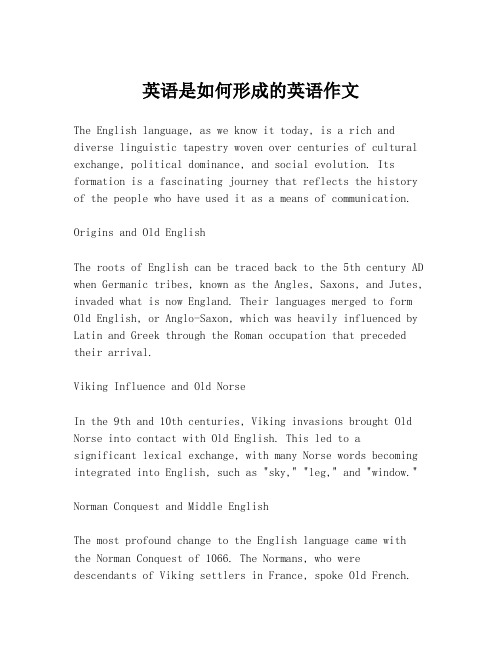
英语是如何形成的英语作文The English language, as we know it today, is a rich and diverse linguistic tapestry woven over centuries of cultural exchange, political dominance, and social evolution. Its formation is a fascinating journey that reflects the history of the people who have used it as a means of communication.Origins and Old EnglishThe roots of English can be traced back to the 5th century AD when Germanic tribes, known as the Angles, Saxons, and Jutes, invaded what is now England. Their languages merged to form Old English, or Anglo-Saxon, which was heavily influenced by Latin and Greek through the Roman occupation that preceded their arrival.Viking Influence and Old NorseIn the 9th and 10th centuries, Viking invasions brought Old Norse into contact with Old English. This led to asignificant lexical exchange, with many Norse words becoming integrated into English, such as "sky," "leg," and "window."Norman Conquest and Middle EnglishThe most profound change to the English language came with the Norman Conquest of 1066. The Normans, who were descendants of Viking settlers in France, spoke Old French.This led to a period where English society was bilingual, and eventually, Middle English emerged, characterized by a vast influx of French and Latin vocabulary, particularly in the areas of law, government, and literature.The Great Vowel Shift and Early Modern EnglishAround the 15th century, a significant transformation known as the Great Vowel Shift occurred. This was a major change in the pronunciation of long vowels, which ultimately affected the spelling and sound of English. With the invention of the printing press by Gutenberg in the 16th century, there was a need for standardization, leading to the creation of Early Modern English.Colonialism and Global InfluenceThe expansion of the British Empire in the 17th and 18th centuries spread English across the globe. Contact with other languages led to the incorporation of new words and phrases into the language, enriching its lexicon and making it atruly global language.Modern English and the Digital AgeIn the 20th and 21st centuries, English has continued to evolve with the advent of technology and the internet. New words and slang are constantly being created, and the language is adapting to new forms of communication, such as texting and social media.ConclusionThe formation of the English language is an ongoing process that reflects the dynamic nature of human interaction and the world's changing cultural landscape. As a living language, it continues to grow and change, making it a subject of endless fascination for linguists, historians, and language enthusiasts alike.。
- 1、下载文档前请自行甄别文档内容的完整性,平台不提供额外的编辑、内容补充、找答案等附加服务。
- 2、"仅部分预览"的文档,不可在线预览部分如存在完整性等问题,可反馈申请退款(可完整预览的文档不适用该条件!)。
- 3、如文档侵犯您的权益,请联系客服反馈,我们会尽快为您处理(人工客服工作时间:9:00-18:30)。
10
Criticism
Influx of foreign vocabulary attracted criticism from purists. In defense of English, there was an attempt to use obsolete English terms but failed. The increase in foreign borrowings in English is the most distinctive sign of the renaissance in English. Never had it been borrowed this much in English.
English had no words to talk about new concepts, techniques, and inventions which were coming from Europe. Writers borrow huge amount of words.
8
Vocabulary issue.
2
Printing: key factor of change
The key factor of the early modern English era was printing. The role of printing:
Fostering norms of spelling and punctuation. Provide more opportunities for people to write. More works published 20,000. Mostly about grammar, vocabulary, writing system, and style.
17
The emerging orthographic systems
The writing system remained highly inconsistent. The blame was on the printing for many reasons:
3
The first English printer
William Caxton. Learned the printing techniques in cologne, France. Set up printing facilities in 1476 in Westminster, near the royal court. When he died, the press was taken over by Worde, and moved to Fleet street in London. From court to city.
5
Transitional texts
Many works of several authors showcased the linguistic transition from ME to early Modern English. There are many points which can cause difficulty in reading to modern English like vocabulary, spellings, grammar; but over all language is intelligible.
11
Influential literary and publications
The 2 most influential works on the development of English in this renaissance period are the works of:
William Shakespeare (1564-1616) King James’ Bible (1611)
12
The influence of William Shakespeare
Lexical firsts: Shakespeare’s work is influential in terms of “the first recorded use” of his vocabulary in his plays. Eg. Obscene., puppi-dogges Shakespearean influence was mainly on lexicon: the use, pronunciation, word formation and syntax, & language use. Making verbs from nouns: out herod Herod, season your admiration, ghosted, dog them at heels.
6
The Age of Bibles
Many versions of the Bible translated and published (8). King James’ Bible was the preferred one: the authorized version published in 1611 All the versions vary greatly in terms of: theological slant, stylistic level, typography, presentation, editorial matter, & mode of presentation.
4
The first printed works
Caxton printed 103 separate items which can be divided in 4 groups:
His own translations Works of the courtly poet of 1350-1450: mainly Chaucer, Gower, Lydgate Prose works in English including translations from other languages. A miscellaneous group of work: phrase books etc.
7
English during the renaissance.
The period from Caxton(1476) until 1650 was called the renaissance. Because of “flood” of publication in English. The interest was mainly on vocabulary.
13
The influence of William ShaFra bibliotekespeare
Words used in Shakespeare’s survived into modern English but some did not survived. Diverse hyphenation: hyphenated compounds. Linguistic creativity: every concept and play with it. Knave. (p. 53)
Early Modern & Modern English
1
Early Modern English
There is no consensus when the early modern English period begins. Many chose the time line 1400-1450: after a great vowel shift. Some chose 1500: the printing revolution. 1476 is when Caxton set up his press at Westminster. 1400-1800 Era of early modern English which is the time line between Chaucer and Johnson.
14
The influence of King James’ Bible
Published in 1611 as authorized version. It was appointed to be read in Churches throughout the Kingdom. Thus, influenced the population as a whole. In 1603, King James was requested to do new translation of the Bible. 54 translators took 4 years to translate and 9 months to revise. The 1st edition came 2 years later.
Most words entered English were mainly from: Latin, Greek, French, Italian, Spanish and Portuguese. World-wide exploration period: English borrowed from 50 other languages including indigenous languages of N. America, Africa, & Asia. Words entered English directly or indirectly via other languages such as French or Latin.
9
“enrich” the language.
Thomas Elyot went out to explore new words and concepts to use in English, to enrich the language. He claimed that: English was not equipped with, or not an appropriate vehicle for the expression of the new learning. Thus, cannot be compared with Latin and Greek. It was the language for the street and not for the library.
